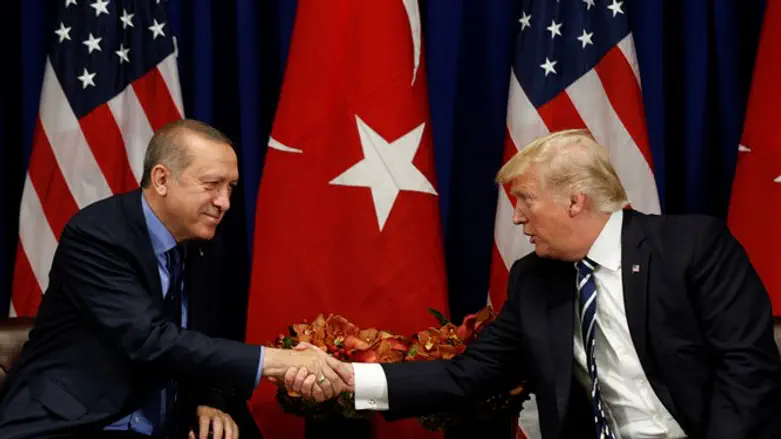
U.S. President Donald Trump on Wednesday spoke with his Turkish counterpart Recep Tayyip Erdogan and urged him to limit his forces' assault against a Kurdish enclave in northern Syria, the White House said, according to AFP.
In a telephone call, Trump called on Erdogan to "de-escalate" the attack on the northern Syrian region of Afrin and expressed concern about "the destructive and false" anti-American rhetoric emanating from Turkey.
Over the weekend Turkish forces, backed by local Syrian Arab fighters, launched an incursion into Afrin, a border canton administered by a local Kurdish-led council and defended by the YPG militia.
The U.S. has been arming, training, and supporting the Syrian Democratic Forces in Syria, and the strongest element of that group is the YPG, a Kurdish group with ties to Kurds in Turkey, including the PKK.
The U.S. makes a distinction between the YPG and the PKK, but Turkey does not and has more than once expressed its outrage over the American support for YPG.
Kurdish leaders have demanded that the United States rein in Turkey, a NATO ally, and vowed to resist its cross-border operation.
According to a White House statement, Trump "urged Turkey to de-escalate, limit its military actions, and avoid civilian casualties and increases to displaced persons and refugees.
"He urged Turkey to exercise caution and to avoid any actions that might risk conflict between Turkish and American forces," it added.
U.S.-Turkey relations have been strained in recent months over several issues. In addition to being angry over the American support for YPG, Erdogan has increasingly attacked Trump over his recognition of Jerusalem as Israel’s capital.
Erdogan warned the United States not to recognize Jerusalem as Israel’s capital, or to move its embassy in Israel to Jerusalem, saying that any change to the status quo vis-à-vis Jerusalem would constitute a “red line” for Muslims.
Later, he said Trump should have called him before announcing his decision to recognize Jerusalem as Israel’s capital, claiming, “I believe this mistake would not have been made if Mr. Trump had made his consultation with us.”
Last month, the two countries resumed full visa services for the other country after a disputeIn October, the U.S. mission in Turkey reduced visa services in response to a U.S. mission employee being detained in Turkey.
The Turkish mission in Washington subsequently announced a similar move, with both sides saying they needed to reassess each other's commitment to the security of their personnel.
The U.S. mission employee who was arrested was the second employee detained by Turkey for purported ties to Fethullah Gulen, a cleric blamed for last year's failed coup attempt in the country.
Gulen currently resides in exile in the United States. He leads a popular movement called Hizmet and split from President Recep Tayyip Erdogan over a corruption scandal in 2013. Erdogan has long accused him of running a parallel state from abroad.
Turkey has pressed, so far in vain, for the United States to extradite Gulen over the July 2016 coup, in which more than 240 people were killed.